Flight to Baku
The plan for today was that we would leave the hotel in Aktau at 00:15 (thats right 15 minutes after midnight) to head to the airport for a 2:55 plane to the city of Baku in Azerbaijan. However the plane was delayed and did not leave until 5:00 which deposited us in Baku about 5:00 Baku time. To get to our hotel our minibus had to cross the city which turned out to be a difficult process because Baku was in the throws of preparing for their annual F1 race which was scheduled for the 13-15th of Sept. So streets were blocked off, and police were everywhere directing traffic; even at 5:00am.
The downtown area of Baku was quite amazing with a veritable forest of new highrise buildings of imaginitive designs; a far cry from what I remember of this city in 2008 when Nina and I last visited. I guess an income of $33B per year from oil and gas gives a country's elite the capacity to massgae their ego.
After some breakfast and freshening-up at the hotel we started the days sightseeing itinerary. Because Azerbaijan is nominally an Islamic country we started with a famous Mosque that has over the years been destroyed by various invaders including the Mongols and the USSR.
A more interesting site was the numerous oil wells located within the city boundary still pumping away collecting their black gold. At one location we saw a wooden oil well and pump that claimed to be the first "industrially drilled" oil well in the world with a date of 1846. This got me googling "the worlds first oil well", and it turns out that there are various claims. The Drake well in the USA of 1859 is "the first commercial" oil well, but the big surprise to me was that the Chinese were "drilling" for oil as early as 347 AD. They were using the oil to evaporate salt water to make salt. There are various other historical harvesting and uses of oil. One claim Here suggests that 4000 years ago the streets of Babylon were paved with tar (an oil product).
Another interesting fact from the history of oil is the role of gasoline in the early days of modern oil production. The Drake oil operation in Pennsylvania (which commenced in 1859) see herewas primarily concerned with the production of kerosene for oil lamps. Gasoline was a useless by product of the Drake operation until 1892 when it was finally recognized as a valuable fuel for the fledgling automobile industry.
Following this dive into the history of oil we spent a number of hours exploring the old city of Baku where the highlights were perhaps the The Palace of Shirvanshahs and the Maiden Tower. As you might imagine with the F1 race only a few days away, the city was incredibly crowded and there were frantic last minute preparations of all kinds under way.
We completed the day with a visit to Highland Park, an extensive garden and memorial setting which provided a fine view of the city. Near by are the three buildings comprising the Flaming Towers, though unfortunately our photo collection only caught two of the towers. I was assured by our guide that we would hear more about Bakus Three Flames tomorrow.
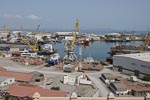
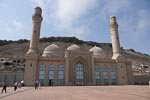
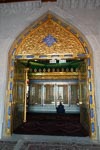
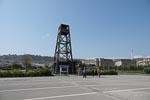
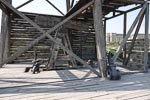

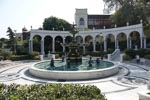
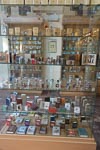
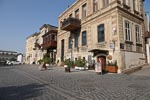
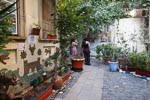
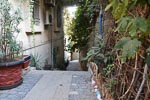
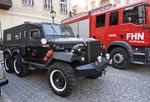
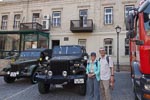
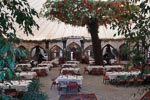
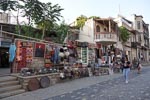

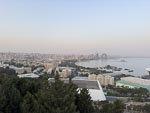
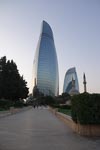
and here